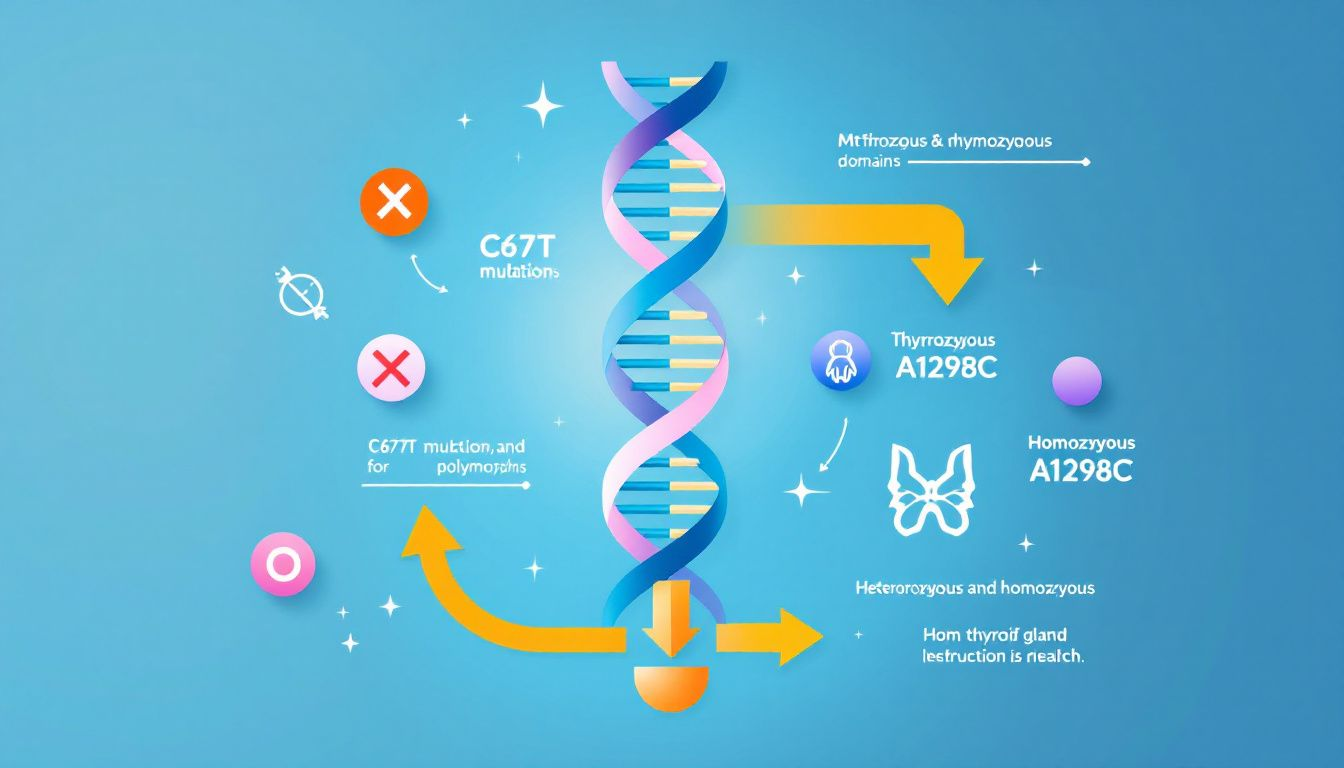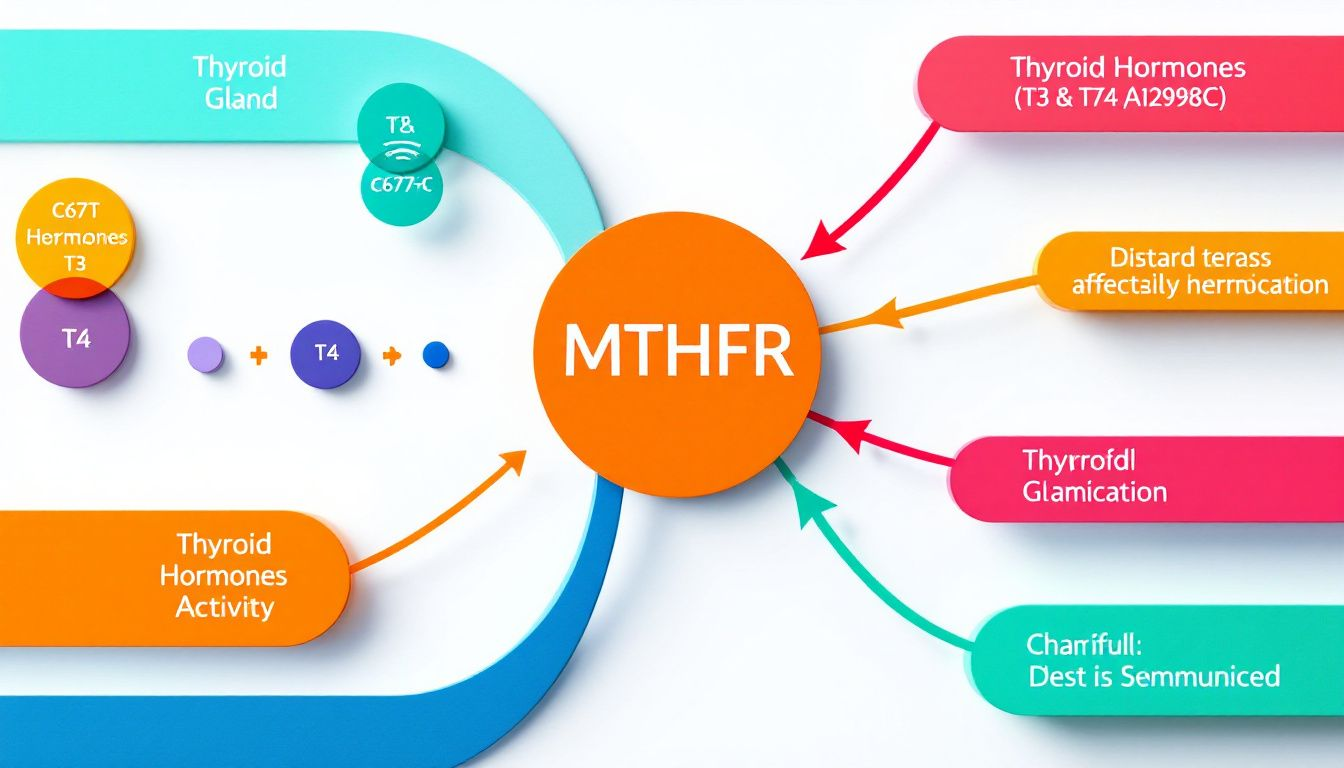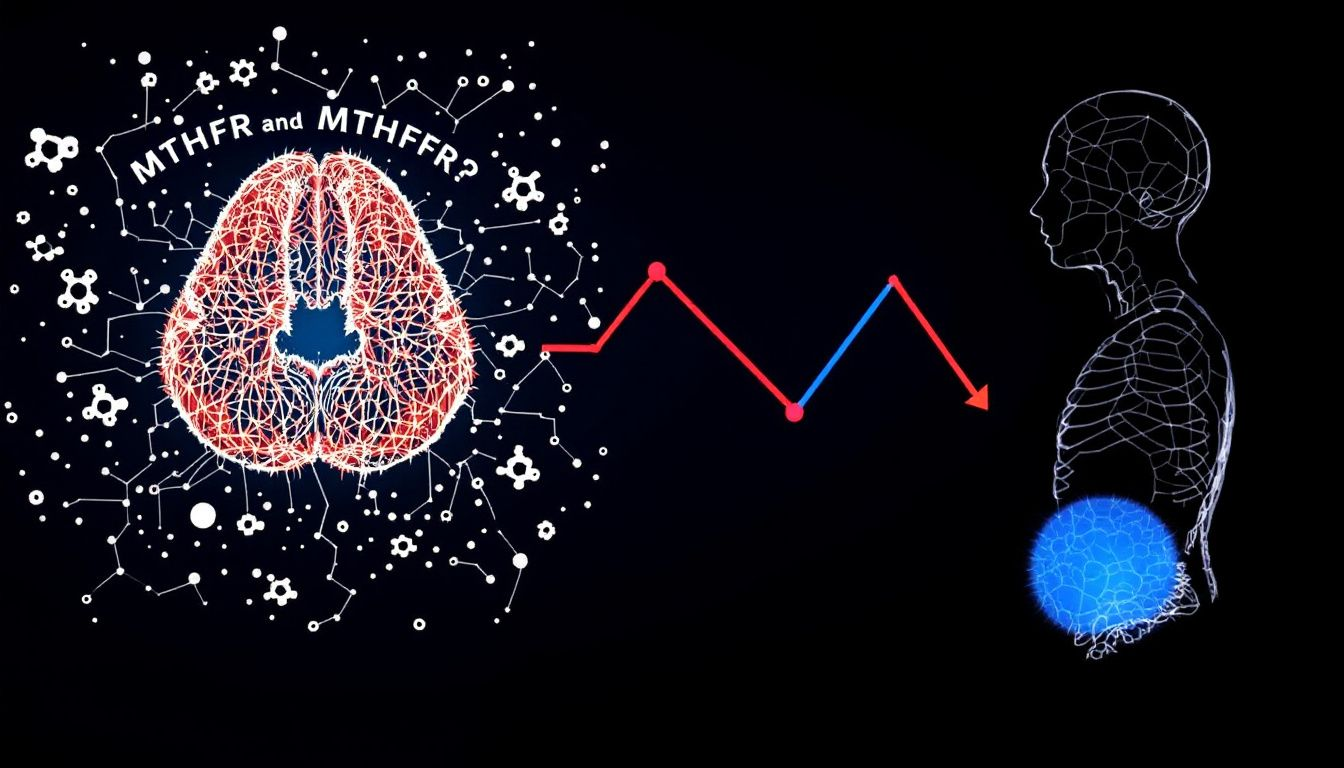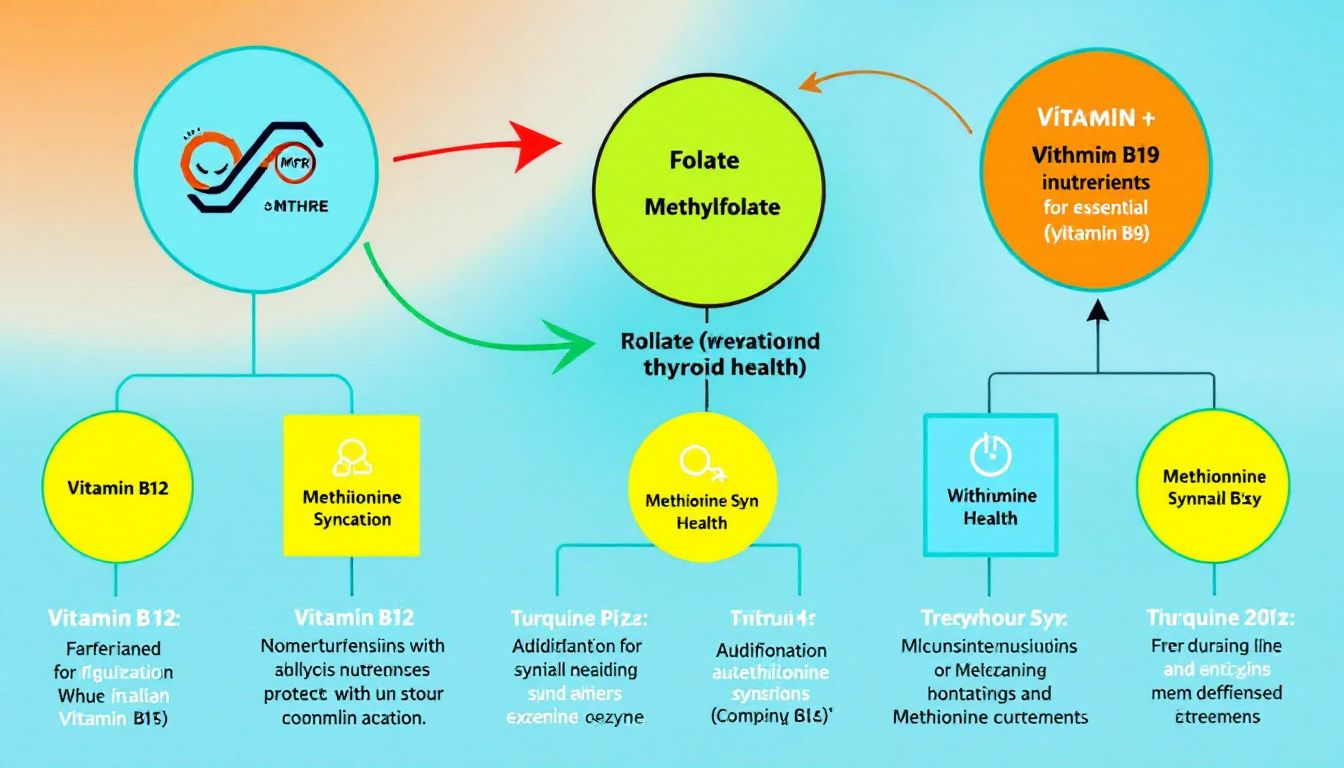Are you wondering how the MTHFR gene might be affecting your thyroid health? The MTHFR gene plays a key role in important bodily processes, and variations in this gene can have a significant impact on thyroid function. In this article, we will explore the connection between MTHFR and thyroid health, discussing how these genetic mutations can influence hormone production, detoxification, and autoimmune responses. Understanding this connection can help you take proactive steps to support your thyroid and overall well-being.
Key Takeaways
The MTHFR gene is crucial for folate metabolism and methylation, with polymorphisms potentially leading to increased homocysteine levels and various health issues, including thyroid dysfunction.
MTHFR mutations can negatively impact thyroid hormone production, detoxification processes, and increase susceptibility to autoimmune diseases, highlighting the importance of monitoring and managing these genetic variations.
Adequate intake of essential nutrients, particularly methylated B vitamins and antioxidants, is vital for supporting methylation pathways and optimal thyroid health in individuals with MTHFR mutations.
Understanding MTHFR Gene Polymorphisms

The MTHFR gene, short for methylenetetrahydrofolate reductase, plays a critical role in folate metabolism and the regulation of homocysteine levels in the body. This gene is responsible for producing the MTHFR enzyme, which is crucial for converting folate (vitamin B9) into its active form, methylfolate. Methylfolate is essential for DNA methylation, a process that regulates gene expression and maintains genomic stability.
Common genetic variations in the MTHFR gene, such as C677T and A1298C, can reduce the efficiency of the enzyme. This leads to decreased methylation and elevated homocysteine levels, which are risk factors for health issues like cardiovascular diseases and neurological disorders.
The prevalence of MTHFR polymorphisms like C677T varies across populations, being more common in certain ethnic groups. These genetic variation can influence the impact of MTHFR mutations on health.
MTHFR mutations that impair methylation can affect multiple biological processes like detoxification, neurotransmitter synthesis, and DNA repair. Compromised methylation can lead to various health issues, highlighting the need for proper nutrition and lifestyle adjustments.
Identifying specific polymorphisms c677t and a1298c through genetic testing can help recognize individuals at risk for health issues related to impaired methylation, guiding personalized health strategies.
In summary, the MTHFR gene and its polymorphisms are vital for folate metabolism and methylation. Variations can impair enzyme activity, elevate homocysteine levels, and cause various health issues. Understanding these genetic variations, including mthfr genes, enables proactive steps to support methylation and overall health.
The Role of MTHFR in Thyroid Function

The connection between MTHFR and thyroid health is a topic of growing interest among researchers and healthcare professionals. The thyroid gland, responsible for producing thyroid hormones, relies on efficient methylation pathways for optimal function. MTHFR mutations can significantly impact these pathways, leading to thyroid dysfunction and related health issues.
MTHFR mutations can impact thyroid health by affecting hormone production. Methylation is crucial for activating thyroid hormones by converting T4 into T3. Compromised MTHFR enzyme activity can hinder this conversion, leading to hormone imbalances and thyroid dysfunction.
MTHFR mutations can also affect detoxification, a process vital for thyroid health. Variations can impair the body’s ability to clear toxins, increasing the risk of thyroid issues, especially during high methylation demands like pregnancy.
Autoimmune thyroid diseases like Hashimoto’s thyroiditis and Graves’ disease are linked to MTHFR mutations. These mutations can exacerbate immune responses, leading to chronic inflammation and thyroid dysfunction.
Recognizing MTHFR’s role in thyroid function underscores the need to address methylation and detoxification pathways. Managing MTHFR mutations can help optimize thyroid function and reduce related health risks.
In conclusion, MTHFR mutations profoundly impact thyroid health by affecting hormone production, detoxification, and autoimmune responses. Addressing these genetic variations is key to maintaining optimal thyroid function and overall health.
Common Thyroid Disorders Linked to MTHFR

Before: Thyroid disorders are among the most common health issues linked to MTHFR mutations. Conditions such as hypothyroidism, hyperthyroidism, Hashimoto’s thyroiditis, and Graves’ disease have all been associated with variations in the MTHFR gene. Understanding these connections can help individuals manage their thyroid health more effectively.
After: Thyroid disorders are among the most common health issues linked to MTHFR mutations. These conditions include:
Hypothyroidism
Hyperthyroidism
Hashimoto’s thyroiditis
Graves’ disease
Understanding these connections can help individuals manage their thyroid health more effectively.
Hypothyroidism, marked by an underactive thyroid gland, is commonly linked to MTHFR mutations. These polymorphisms hinder the conversion of T4 into T3, causing symptoms like fatigue, weight gain, and depression. Elevated homocysteine levels can further exacerbate thyroid dysfunction and oxidative stress.
Hyperthyroidism involves an overactive thyroid producing excessive hormones. Though less common, MTHFR mutations can disrupt hormone balance and increase the risk of thyroid dysfunction, highlighting the complex interplay between genetics and thyroid health.
Autoimmune thyroid diseases like Hashimoto’s thyroiditis and Graves’ disease are closely linked to MTHFR mutations. In Hashimoto’s thyroiditis, MTHFR variations exacerbate immune attacks on the thyroid, leading to chronic inflammation and gland damage, which can be associated with an autoimmune disease.
Graves’ disease involves the immune system stimulating the thyroid to produce excessive hormones. MTHFR polymorphisms can increase susceptibility to autoimmune responses and inflammation, aiding in the development and progression of Graves’ disease. Understanding these genetic links helps manage these conditions more effectively.
Research indicates specific MTHFR haplotypes, like CC and TA, are linked to a lower risk of hypothyroidism. However, thyroid dysfunction is more prevalent among females, suggesting gender may influence susceptibility to thyroid diseases.
The link between MTHFR mutations and thyroid disorders highlights the importance of genetic testing and personalized health strategies. Identifying and addressing these genetic variations enables proactive steps to support thyroid health and reduce related risks.
How MTHFR Influences Autoimmune Thyroid Disease

Autoimmune thyroid diseases, such as Hashimoto’s thyroiditis, are significantly influenced by MTHFR gene variations. These genetic variations increase the susceptibility to autoimmune conditions by affecting the body’s methylation processes and immune system regulation. Understanding the role of MTHFR in autoimmune thyroid disease is crucial for managing these conditions effectively.
MTHFR gene variations can hinder the production of methylfolate, crucial for immune function. Reduced methylfolate can lead to increased inflammation and a higher risk of autoimmune diseases.
In Hashimoto’s thyroiditis, MTHFR mutations can exacerbate immune dysregulation and chronic inflammation, intensifying immune attacks on the thyroid and making the disease harder to manage.
Understanding one’s MTHFR status is crucial for managing autoimmune thyroid diseases. Genetic testing can identify MTHFR polymorphisms, offering insights into genetic predispositions and guiding personalized treatment strategies to support methylation and reduce inflammation.
Defective MTHFR functioning due to genetic mutations can severely affect metabolism and methylation, crucial for managing autoimmune thyroid diseases. Addressing these variations through targeted nutrition and lifestyle changes can improve immune function and overall health.
In summary, MTHFR gene variations significantly influence the development and progression of autoimmune thyroid diseases. Understanding these genetic links and taking proactive steps to support methylation and immune function are vital for effectively managing conditions like Hashimoto’s thyroiditis.
Nutrients Essential for Methylation and Thyroid Health

Supporting methylation and maintaining thyroid health requires a well-balanced intake of essential nutrients. Folate, B6, B12, and riboflavin are crucial for reducing elevated homocysteine levels and supporting overall thyroid function. Nutritional deficiencies in these vitamins can elevate the risk of thyroid disorders, especially in individuals with MTHFR variations.
Antioxidants are also necessary to combat oxidative stress associated with thyroid conditions. Below is a deeper dive into the role of these nutrients.
Folate and Folic Acid
Folate, a naturally occurring form of vitamin B9, is essential for thyroid hormone synthesis and overall thyroid health. The MTHFR enzyme converts folic acid, the synthetic form of folate, into its active form, methylfolate. This conversion is crucial for maintaining healthy methylation processes, which regulate gene expression and support numerous bodily functions.
Those with MTHFR variations may have decreased active folate levels, leading to impaired methylation and elevated homocysteine, which is linked to cardiovascular diseases and thyroid dysfunction. Ensuring adequate folate intake supports methylation pathways and overall health.
Excessive synthetic folic acid can disrupt DNA methylation and cause health issues. Balancing folate intake and avoiding overconsumption of synthetic folic acid is crucial, especially for those with MTHFR variations. Methylated B vitamins can ensure proper absorption and utilization without the risks.
Folate is crucial for converting homocysteine to methionine, essential for protein synthesis and thyroid hormone production. Adequate folate levels maintain optimal thyroid function and prevent related health issues. Those with MTHFR mutations should prioritize dietary folate sources like leafy greens, legumes, and fortified foods.
In summary, folate is essential for thyroid hormone synthesis and overall thyroid health. The MTHFR enzyme’s role in converting synthetic folic acid into its active form underscores the need to manage MTHFR variations. Adequate intake of natural folate and avoiding excessive synthetic folic acid supports methylation and reduces thyroid dysfunction risk.
B Vitamins (B6, B12, Riboflavin)
B vitamins are integral to supporting methylation pathways and ensuring optimal thyroid hormone metabolism. Among these, riboflavin (vitamin B2) is particularly important for MTHFR function. Riboflavin converts into FAD (flavin adenine dinucleotide), which is used by the MTHFR enzyme to process folate into its active form. Without adequate riboflavin, the MTHFR enzyme cannot function properly, leading to impaired methylation and elevated homocysteine levels.
The conversion of riboflavin to its usable form requires the presence of the thyroid hormone thyroxine (T4). This interplay underscores the interconnectedness of B vitamins and thyroid hormones in maintaining metabolic balance. Ensuring sufficient riboflavin intake is crucial for supporting the MTHFR enzyme and, by extension, thyroid health.
Vitamin B6 (pyridoxine) and vitamin B12 (cobalamin) also play pivotal roles in methylation and thyroid function. Vitamin B6 is essential for the conversion of homocysteine to cysteine, another amino acid necessary for various bodily functions. This process helps lower elevated homocysteine levels, reducing the risk of cardiovascular diseases and supporting overall health.
Vitamin B12 is crucial for maintaining healthy nerve cells and producing DNA and RNA. In the context of thyroid health, B12 helps convert homocysteine back into methionine, supporting methylation pathways and the production of SAMe (S-adenosylmethionine), a vital methyl donor for numerous biochemical reactions.
Individuals with MTHFR mutations often require higher levels of these B vitamins to support their methylation processes. Supplementing with methylated forms of B6, B12, and riboflavin can help ensure proper absorption and utilization, addressing the unique needs of those with impaired MTHFR enzyme activity.
In summary, B vitamins, particularly riboflavin, B6, and B12, are essential for supporting methylation pathways and thyroid hormone metabolism. Ensuring adequate intake of these vitamins through diet and supplementation can help individuals with MTHFR mutations maintain optimal thyroid health and overall well-being.
Testing for MTHFR and Thyroid Dysfunction
Testing for MTHFR genetic variations is a crucial step in understanding and managing thyroid health. MTHFR genetic testing can identify common alterations, such as the C677T and A1298C polymorphisms, which can lead to elevated homocysteine levels and impact thyroid function. Knowing one’s MTHFR status can provide valuable insights into potential health risks and guide personalized treatment strategies.
Patients with hypothyroidism often display elevated homocysteine levels, which can adversely affect thyroid function and be influenced by MTHFR gene variations. Elevated homocysteine is associated with oxidative stress, which can damage thyroid cells and further exacerbate thyroid dysfunction. Testing for MTHFR variations can help identify the underlying genetic factors contributing to these elevated levels.
A genetic test can determine the presence of MTHFR gene variants, which may contribute to higher homocysteine levels. The testing process typically involves a simple blood sample, which is analyzed to detect the presence of one or both common gene changes. This information can help healthcare providers develop targeted treatment plans to support methylation and thyroid health.
MTHFR testing is not routinely recommended for everyone but may be particularly beneficial for individuals with a family history of cardiovascular issues or elevated homocysteine levels. Understanding one’s genetic predisposition can help proactively manage health and prevent potential complications associated with impaired methylation and thyroid dysfunction.
In addition to MTHFR testing, assessing thyroid function through tests measuring thyroid stimulating hormone (TSH), free T3, and free T4 levels is essential. These tests provide a comprehensive picture of thyroid health and help identify any imbalances or dysfunctions that may be present. Combining MTHFR and thyroid function tests can offer a holistic approach to managing thyroid health.
In conclusion, testing for MTHFR genetic variations and thyroid dysfunction is a critical step in understanding and managing one’s health. By identifying genetic predispositions and assessing thyroid function, individuals can take proactive steps to support their methylation pathways and maintain optimal thyroid health.
Managing Thyroid Health with MTHFR Mutations
Managing thyroid health in individuals with MTHFR mutations requires a multifaceted approach that includes dietary changes, addressing nutritional deficiencies, and using targeted supplements. Supporting impaired methylation pathways is crucial for those with MTHFR variations to maintain optimal thyroid function and overall health.
Let’s explore dietary recommendations and supplementation strategies in detail.
Dietary Recommendations
A gluten-free and anti-inflammatory diet can be particularly beneficial for individuals with MTHFR mutations and autoimmune thyroid disease. Gluten has been shown to exacerbate autoimmune responses, and eliminating it from the diet can help reduce inflammation and support thyroid health. Additionally, incorporating anti-inflammatory foods such as fatty fish, leafy greens, and berries can further support thyroid function and overall well-being.
Before:
Managing overmethylation may require specific dietary adjustments to balance methylation pathways. Individuals with MTHFR mutations should focus on nutrient-dense foods that support methylation, such as leafy greens, legumes, nuts, and seeds. These foods provide essential vitamins and minerals that help maintain proper methylation processes.
After:
Individuals with MTHFR mutations should focus on nutrient-dense foods that support methylation, such as:
Leafy greens
Legumes
Nuts
Seeds
These foods provide essential vitamins and minerals that help maintain proper methylation processes.
In addition to avoiding gluten, individuals with MTHFR mutations should also be mindful of other potential dietary triggers that can affect thyroid health. Processed foods, refined sugars, and trans fats can contribute to inflammation and should be limited. Instead, focus on whole, unprocessed foods that provide the necessary nutrients for optimal thyroid and overall health.
Dietary changes are crucial for supporting methylation pathways and improving thyroid health in individuals with MTHFR mutations. By making mindful food choices and avoiding potential dietary triggers, individuals can better manage their thyroid health and reduce the risk of thyroid-related health issues.
In conclusion, adopting a gluten-free and anti-inflammatory diet can significantly benefit individuals with MTHFR mutations and autoimmune thyroid disease. By focusing on nutrient-dense foods and avoiding potential dietary triggers, individuals can support their methylation pathways and maintain optimal thyroid health.
Supplementation Strategies
Supplementing with methylated B vitamins is essential for managing MTHFR mutations and improving thyroid health. Methylated forms of folate, B6, and B12 are more readily absorbed and utilized by the body, making them particularly beneficial for individuals with impaired MTHFR enzyme activity. These supplements can help support methylation processes and reduce elevated homocysteine levels.
Patients with Hashimoto’s thyroiditis have reported significant improvements in energy, mood, and pain management after incorporating methylation-supporting supplements into their regimen. Methylated B vitamins, along with other supplements such as magnesium, zinc, and selenium, can provide the necessary support for thyroid health and overall well-being.
The absorption of vitamin B12 requires support from Betaine HCl and pepsin, particularly in individuals with low stomach acid levels. Ensuring proper B12 absorption is crucial for maintaining healthy methylation pathways and supporting thyroid function. Betaine HCl and pepsin supplements can help improve B12 absorption and address potential deficiencies.
In addition to methylated B vitamins, individuals with MTHFR mutations may benefit from other supplements that support detoxification and oxidative stress reduction. Antioxidants such as vitamin C, vitamin E, and glutathione can help combat oxidative stress and support overall health. These supplements can be particularly beneficial for individuals with thyroid conditions and MTHFR mutations.
In summary, supplementation strategies for managing MTHFR mutations and thyroid health should focus on methylated B vitamins, antioxidants, and other nutrients that support methylation and detoxification pathways. By incorporating these supplements into their daily regimen, individuals with MTHFR mutations can improve their thyroid health and overall well-being.
Potential Risks and Precautions
While managing MTHFR mutations and thyroid health through diet and supplementation is beneficial, it’s essential to be aware of potential risks and precautions. Overmethylation can occur when individuals receive excessive methylation support, leading to symptoms such as anxiety, irritability, and insomnia. Understanding the signs of overmethylation and adjusting supplementation accordingly is crucial for maintaining balance.
Increased anxiety and irritability are common indicators of overmethylation, signaling that an individual may be receiving too much methylation support. These symptoms can mimic those of undermethylation, complicating diagnosis and treatment. It’s important to work closely with a healthcare provider to monitor methylation status and adjust supplementation as needed.
Health issues from overmethylation can affect not only the thyroid but also the adrenals, leading to various other health problems. Careful management of methylation pathways is essential to avoid the negative health consequences associated with overmethylation. This includes regular monitoring of homocysteine levels and adjusting dietary and supplementation strategies as necessary.
False positive results can occur in genetic testing, leading to unnecessary worry and interventions. It’s important to interpret genetic test results in the context of overall health and symptoms, rather than relying solely on genetic data. A comprehensive approach that includes genetic testing, symptom assessment, and functional testing can provide a more accurate picture of health.
In addition to overmethylation, individuals with MTHFR mutations should be cautious about potential interactions between supplements and medications. Certain supplements, particularly high-dose methylated B vitamins, can interact with medications and affect their efficacy. Consulting with a healthcare provider before starting any new supplement regimen is essential to avoid potential risks and ensure safe and effective treatment.
In summary, managing MTHFR mutations and thyroid health requires careful consideration of potential risks and precautions. By monitoring methylation status, working closely with healthcare providers, and being mindful of supplement interactions, individuals can effectively manage their health and avoid negative health consequences.
Summary
Understanding the connection between MTHFR gene polymorphisms and thyroid health is crucial for individuals experiencing thyroid dysfunction or autoimmune thyroid diseases. The MTHFR gene plays a significant role in methylation pathways, which are essential for thyroid hormone production, detoxification, and immune function. Genetic variations in MTHFR can lead to impaired methylation, elevated homocysteine levels, and increased susceptibility to thyroid disorders.
By addressing MTHFR mutations through dietary changes, supplementation, and regular monitoring, individuals can support their methylation pathways and maintain optimal thyroid health. This comprehensive approach can help reduce the risk of thyroid-related health issues and improve overall well-being. Taking proactive steps to understand and manage genetic variations can empower individuals to take control of their health and live healthier lives.
Frequently Asked Questions
What is the MTHFR gene, and why is it important?
The MTHFR gene is essential for folate metabolism and the regulation of homocysteine levels. Variants of this gene can influence methylation processes, potentially affecting an individual’s health.
How do MTHFR mutations affect thyroid function?
MTHFR mutations can lead to impaired conversion of T4 to its active form T3, resulting in thyroid dysfunction. Additionally, these mutations may increase susceptibility to thyroid issues due to compromised detoxification processes.
What are the common thyroid disorders linked to MTHFR mutations?
Common thyroid disorders linked to MTHFR mutations are hypothyroidism, hyperthyroidism, Hashimoto’s thyroiditis, and Graves’ disease, often associated with elevated homocysteine levels and impaired methylation. Proper management of these disorders may necessitate addressing MTHFR-related issues.
How can I test for MTHFR and thyroid dysfunction?
To test for MTHFR and thyroid dysfunction, you should undergo a genetic blood test for MTHFR and thyroid function tests that measure TSH, free T3, and free T4 levels for a complete assessment. This approach will help you understand both your genetic predispositions and thyroid health effectively.
What dietary and supplementation strategies can help manage MTHFR mutations and thyroid health?
Adopting a gluten-free and anti-inflammatory diet, combined with supplementation of methylated B vitamins and antioxidants, is effective in managing MTHFR mutations and supporting thyroid health. It is crucial to collaborate with a healthcare provider for a tailored approach.

